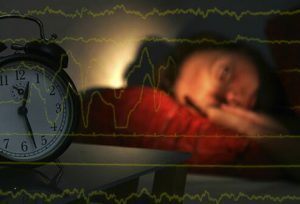- Home
- Editorial
- News
- Practice Guidelines
- Anesthesiology Guidelines
- Cancer Guidelines
- Cardiac Sciences Guidelines
- Critical Care Guidelines
- Dentistry Guidelines
- Dermatology Guidelines
- Diabetes and Endo Guidelines
- Diagnostics Guidelines
- ENT Guidelines
- Featured Practice Guidelines
- Gastroenterology Guidelines
- Geriatrics Guidelines
- Medicine Guidelines
- Nephrology Guidelines
- Neurosciences Guidelines
- Obs and Gynae Guidelines
- Ophthalmology Guidelines
- Orthopaedics Guidelines
- Paediatrics Guidelines
- Psychiatry Guidelines
- Pulmonology Guidelines
- Radiology Guidelines
- Surgery Guidelines
- Urology Guidelines
People who sleep less than 8 hours a night more likely to suffer from depression, anxiety

Sleeping less than the recommended eight hours a night is associated with intrusive, repetitive thoughts like those seen in anxiety or depression, according to new research from Binghamton University, State University of New York.
Binghamton University Professor of Psychology Meredith Coles and former graduate student Jacob Nota assessed the timing and duration of sleep in individuals with moderate to high levels of repetitive negative thoughts (e.g., worry and rumination). The research participants were exposed to different pictures intended to trigger an emotional response, and researchers tracked their attention through their eye movements. The researchers discovered that regular sleep disruptions are associated with difficulty in shifting one's attention away from negative information. This may mean that inadequate sleep is part of what makes negative intrusive thoughts stick around and interfere with people's lives.
"We found that people in this study have some tendencies to have thoughts get stuck in their heads, and their elevated negative thinking makes it difficult for them to disengage with the negative stimuli that we exposed them to," said Coles. "While other people may be able to receive negative information and move on, the participants had trouble ignoring it."
These negative thoughts are believed to leave people vulnerable to different types of psychological disorders, such as anxiety or depression, said Coles.
"We realized over time that this might be important -- this repetitive negative thinking is relevant to several different disorders like anxiety, depression and many other things," said Coles. "This is novel in that we're exploring the overlap between sleep disruptions and the way they affect these basic processes that help in ignoring those obsessive negative thoughts."
The researchers are further exploring this discovery, evaluating how the timing and duration of sleep may also contribute to the development or maintenance of psychological disorders. If their theories are correct, their research could potentially allow psychologists to treat anxiety and depression by shifting patients' sleep cycles to a healthier time or making it more likely a patient will sleep when they get in bed.
The paper, "Shorter sleep duration and longer sleep onset latency are related to difficulty disengaging attention from negative emotional images in individuals with elevated transdiagnostic repetitive negative thinking" was published in ScienceDirect.

Disclaimer: This site is primarily intended for healthcare professionals. Any content/information on this website does not replace the advice of medical and/or health professionals and should not be construed as medical/diagnostic advice/endorsement or prescription. Use of this site is subject to our terms of use, privacy policy, advertisement policy. © 2020 Minerva Medical Treatment Pvt Ltd